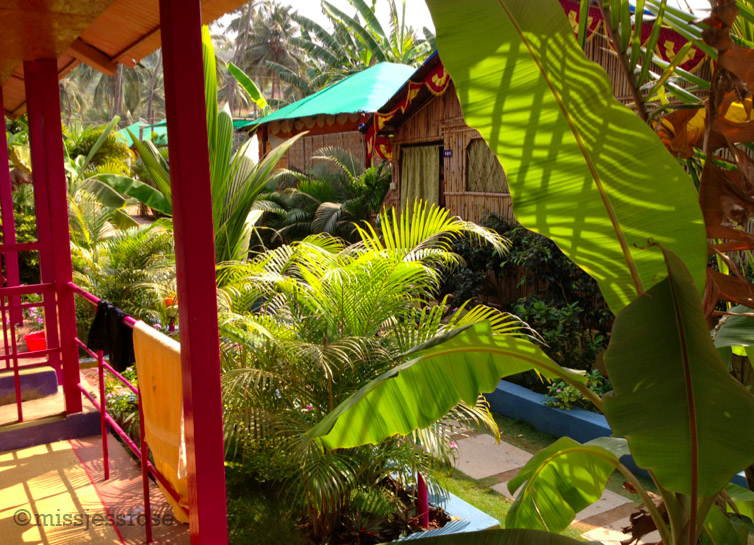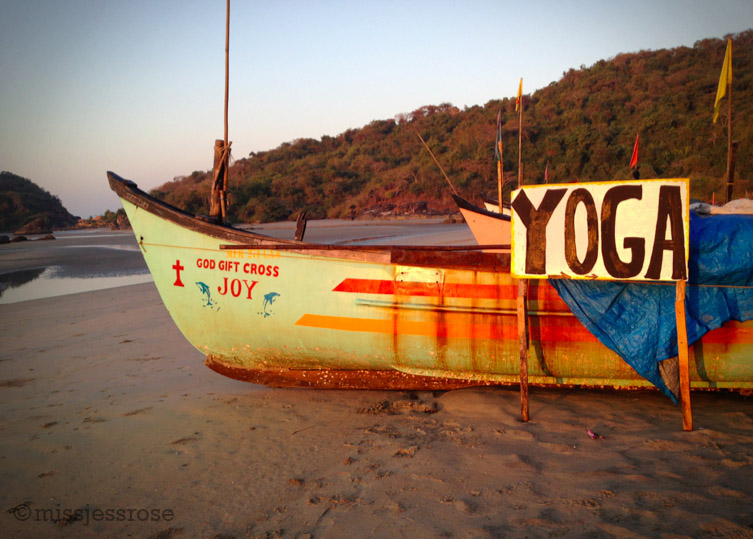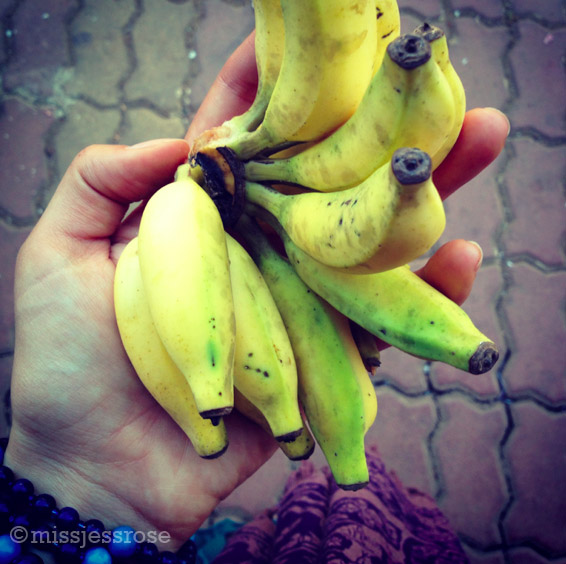I've grown to love late night arrivals. A blanket of darkness wraps around everything keeping it secret until morning's unveiling. There are so many unknowns that come with travel: Will this new bed have bugs in it? Will I die in a rickshaw? Will there be toilet paper? All that is unfamiliar dawns the next day. Ok, maybe not all, but at least you get to see where it is that you've landed.
This morning a flock of birds is squawking loudly through the barely there plywood walls of our beach hut, which are thin and temporary so that they can be dismantled during monsoon season and reassembled again once tourists return for the year. I step outside into the sun, blinking as the shadows from our late night arrival are filled in with light.
The path to the beach from Dreamcatcher in Palolem feels magical whether illuminated by sunlight or cloaked in night shadows
After a flight north from Fort Kochi, several hours in a taxi, and a fumbling walk through a dark sandy pathway, we arrive in southern Goa on the quiet beach of Palolem. This is our home for the next several weeks. We've chosen one of the more peaceful beaches, where prices are still low and the ratio of drunk bikini clad Russians is slightly less than in the north. It's possible to live on less than $15 a day here. Our beach hut is $8 a night per person, and meals at any given seaside restaurant are a few dollars.
Tropical view from a beach hut in Ashvem, northern Goa. We did visit the north for a few nights at the end of our stay in Palolem.
We spend days lounging on the beach, eating parathas, and taking the kayak out to sea at sunrise. Scantily clad Europeans are sometimes a shocking sight in contrast to the sari-wrapped Indian women who comb the garbage-strewn beach, beg, or sell woven bracelets. Cows lounge and sunbath in the sand. Scrapper dogs with puppies howl around dinner time, roaming from table to table in search of food from soft-hearted tourists.
Taking a walk into Palolem, this is the main street through the village
We've been working our way north along the western coast of India and so far it's been uncharted and unplanned. The Indian subcontinent ranks as the seventh largest country in the world, so there's plenty to explore. But I have to admit, I'm glad to be resting on the beach after playing tourist constantly for three months. India can be intense. Compile that with the regular weight of daily unknowns encountered while backpacking the way we are, and things can get stressful at times. When I have down days, it feels like I'm bumbling through a place that is large and irrational, a foreign land that doesn't make sense.
One major challenge we've encountered related to travel in India is transportation. Besides the fact that pretty much all drivers of any vehicle seem erratic and insane by Western standards, we've realized that unlike Europe, popular train routes are booked months in advance. More than once our plans have been foiled by overbooked trains. And buses, well, let's just say that we try to avoid buses as much as possible because we want to stay alive while we're here.
Exhibit A: I watch as two buses collide
We don't want to keep gambling with the transportation, we'd like to construct some knowns. So we decide to swing by a travel agency for advice about planning the next phase of inter-India travel.
The next five hours are spent puzzling together a map of our remaining trip avoiding certain overbooked routes. Not a simple task, especially at a point when I'd hoped to forget the great to-do list of things to see by immediately commencing relaxing beach vacation.
Tying to estimate how much time you'll want to spend in a place, puzzling the pieces together as to how you'll arrive and where you'll stay, making sure you're hitting all the must-see locations — daily speculative planning can be mentally exhausting. Then there is that great looming monster, Fear of Missing Out, hovering over us as we try to guess where our future selves will want to be over the next few months.
And this is when I realize something wonderful — that when you first have the dream to do something big and bold and unfamiliar, something unknown, the very first step towards achieving it is to sit down and begin to map out the few things that you do know in your heart.
The simple motion of taking action, of drafting a skeleton map of where you think you want to go, who you might want to become, or how you think you might get there, this can propel you forward. It can inspire you. It can launch you out of your rut and get you thinking about how your journey can come to be.
Your life can change with a single action: the gesture of identifying a basic known. That's because the effort of putting pen to paper and writing it down makes it real.
After that, somehow, all the overwhelming inherent unknowns don't seem so big and scary. In fact, the way those remaining unknowns mysteriously piece themselves together might turn out to be beautifully surprising. With one piece of the puzzle identified, articulated, and written down, the accompanying mental relief allows your mind to open up and fill in all the other missing bits and pieces. A surprising path unravels and it no longer seems to matter down the line if some of those previous knowns return back to unknowns. This is because your greater plan is evolving. This is because you are moving forward.
Soon we have a hand drawn map of our transportation route that crisscrosses the country from Goa to the very northernmost peaks of the Himalayas. It covers almost all of the places I always wanted to see in India. With fourteen segments of train and plane trips locked in, we can now turn our attention to filling in other pieces of the puzzle.
But we'll save the rest of that planning for later. Right now we have the feeling that we've already done the entire trip, and that there's no need to actually travel any farther. Maybe relaxing tropical beach life is just the thing we need before playing tourist again.





















